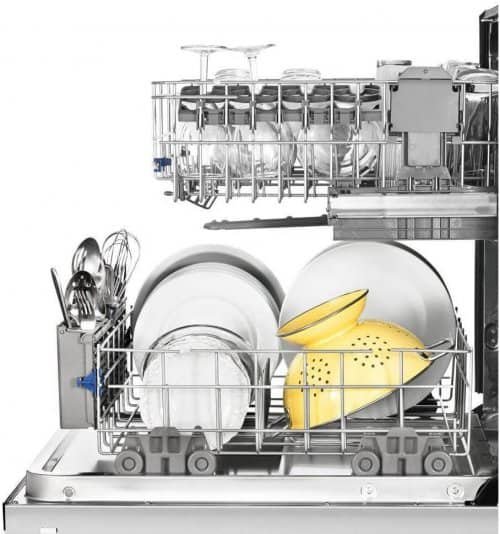In today’s fast-paced world, dishwashers have become an indispensable appliance in many households. They offer convenience, efficiency, and time-saving benefits. But have you ever wondered how dishwashers work? Specifically, do dishwashers use cold water? In this article, we will explore the inner workings of dishwashers, the temperature of water they use, and the impact it has on your dishes’ cleanliness.
Dishwashers have revolutionized the way we clean our dishes, taking the burden off our hands and allowing us to focus on other tasks. Understanding how dishwashers operate and the role of water temperature is essential for optimizing their performance.
Table of Contents
How Do Dishwashers Work?
Dishwashers work by spraying water on the dishes while applying detergent and using various cleaning mechanisms. These mechanisms include spinning arms, jets, and filters, which work together to remove food particles, grease, and stains from your dishes. To ensure effective cleaning, dishwashers utilize a combination of water temperature, detergent, and mechanical action.
The Importance of Water Temperature
Water temperature plays a crucial role in the dishwasher’s cleaning process. Hot water aids in dissolving grease and food particles, providing better cleaning results. It also helps sanitize the dishes by eliminating harmful bacteria. However, the water temperature used in dishwashers is not solely dependent on cold or hot water from your household supply.
Optimal Water Temperature for Dishwashing
The optimal water temperature for dishwashing is generally between 120°F (49°C) and 140°F (60°C). Most dishwashers have heating elements that heat the water to the desired temperature. These heating elements ensure that the water reaches the optimal temperature required for effective cleaning and sanitization.
Cold Water vs. Hot Water
Contrary to popular belief, dishwashers do not solely rely on cold water. They incorporate hot water to achieve the desired temperature range for optimal cleaning. Cold water can be detrimental to the dishwasher’s performance, as it may not effectively remove grease, stains, or bacteria from your dishes. Therefore, dishwashers use a combination of cold and hot water to ensure superior cleaning results.
Energy Efficiency Considerations
Energy efficiency is an important aspect to consider when using a dishwasher. Dishwashers with energy-saving features, such as efficient heating elements and insulation, can help minimize energy consumption. By using hot water efficiently and optimizing the dishwasher’s overall energy usage, you can save both energy and money in the long run.
Cleaning Performance and Sanitation
The primary purpose of a dishwasher is to clean and sanitize your dishes effectively. The combination of hot water, detergent, and mechanical action ensures that your dishes come out sparkling clean and free from harmful bacteria. It is crucial to follow the manufacturer’s instructions for loading the dishwasher properly, using the recommended detergent, and selecting the appropriate wash cycle for optimal cleaning performance.
Pre-rinsing Dishes: Yes or No?
One common question regarding dishwashers is whether pre-rinsing dishes is necessary. Modern dishwashers are designed to handle most food particles and residues without the need for extensive pre-rinsing. However, it is advisable to scrape off large food scraps before loading the dishwasher to prevent clogging and enhance cleaning efficiency.

Tips for Optimal Dishwasher Performance
To ensure optimal performance and longevity of your dishwasher, here are a few tips:
- Follow the manufacturer’s guidelines for loading the dishwasher correctly.
- Use the recommended dishwasher detergent and rinse aid.
- Run the dishwasher with a full load whenever possible to maximize water and energy efficiency.
- Regularly clean the dishwasher’s filter to prevent clogs and maintain performance.
- Schedule periodic maintenance and check-ups to address any potential issues.
Common Dishwasher Myths
- Myth: Dishwashers waste more water than hand washing. Reality: Dishwashers use less water than hand washing, especially when used with full loads.
- Myth: Pre-rinsing dishes is necessary for a thorough clean. Reality: Most modern dishwashers can effectively handle food particles without extensive pre-rinsing.
- Myth: Washing delicate items in a dishwasher will damage them. Reality: Dishwashers often have specific cycles designed for delicate items, ensuring their safe cleaning.
- Myth: Hand washing is more hygienic than using a dishwasher. Reality: Dishwashers can reach higher temperatures, providing better sanitization than hand washing.
- Myth: Dishwashers are noisy and disruptive. Reality: Modern dishwashers are designed to operate quietly, minimizing noise disruptions in your home.
Can I use cold water in my dishwasher?
While dishwashers incorporate hot water for optimal cleaning, cold water alone may not provide effective results. It is recommended to use a combination of cold and hot water for superior cleaning performance.
How hot does the water in a dishwasher get?
The water temperature in a dishwasher typically ranges from 120°F (49°C) to 140°F (60°C) for effective cleaning and sanitization.
Do I need to pre-rinse my dishes before loading them into the dishwasher?
Extensive pre-rinsing is usually unnecessary. However, it is advisable to scrape off large food scraps to prevent clogs and optimize cleaning performance.
How often should I clean my dishwasher’s filter?
Regularly cleaning the dishwasher’s filter is recommended to prevent clogs and maintain optimal performance. Check the manufacturer’s guidelines for specific cleaning instructions.
Conclusion
Dishwashers are a convenient and efficient way to clean your dishes. They utilize a combination of cold and hot water to achieve optimal cleaning results and sanitation. By following the manufacturer’s instructions and incorporating energy-saving practices, you can enjoy clean dishes while minimizing your environmental impact.
In conclusion, dishwashers do not solely use cold water. They rely on a combination of cold and hot water to achieve the optimal temperature range for effective cleaning and sanitization. By understanding how dishwashers work and following best practices, you can ensure clean and sanitized dishes while maximizing energy efficiency.

